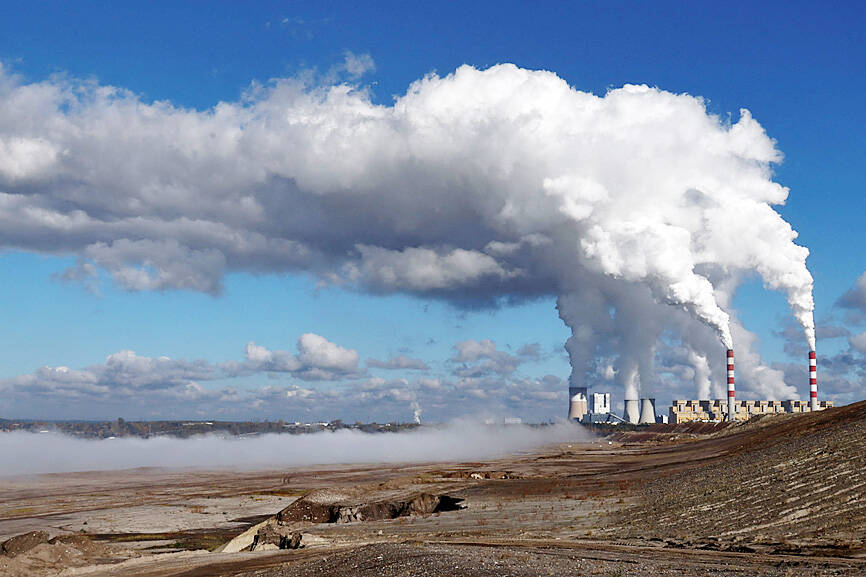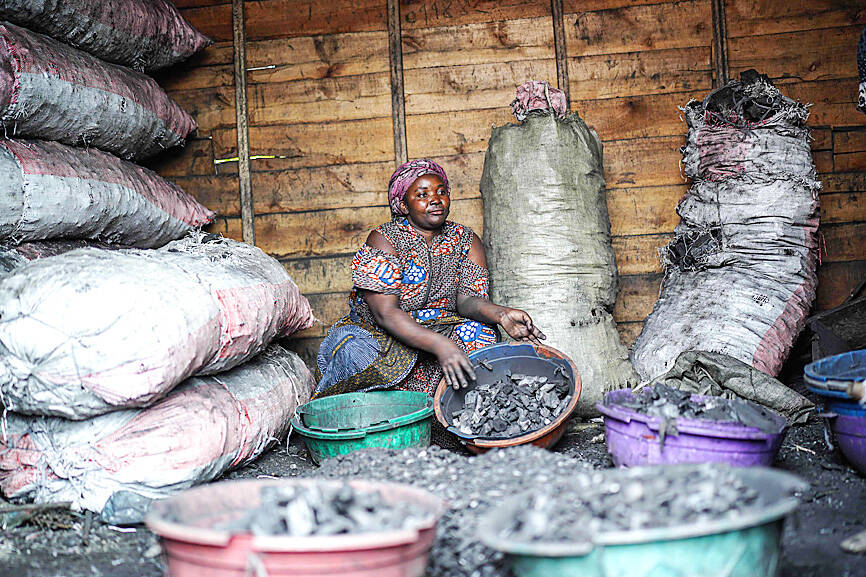Global coal consumption is set to rise to an all-time high this year and remain at similar levels in the next few years if stronger efforts are not made to move to a low-carbon economy, a report by the International Energy Agency (IEA) said yesterday.
High gas prices following Russia’s invasion of Ukraine and consequent disruptions to supply have led some countries to turn to relatively cheaper coal, while heat waves and droughts in some regions have also driven up electricity demand and reduced hydropower. Nuclear generation has also been very weak, especially in Europe, where France had to shut down nuclear reactors for maintenance.
The annual report on coal forecasts that global coal use is to rise 1.2 percent this year, exceeding 8 billion tonnes in a single year for the first time and a previous record set in 2013.

Photo: Reuters
It also predicts that coal consumption would remain flat at that level to 2025, as falls in mature markets are offset by continued strong demand in emerging Asian economies.
This means coal would continue to be the global energy system’s largest single source of carbon emissions.
The largest increase in coal demand is expected to be in India, at 7 percent, followed by the EU at 6 percent and China at 0.4 percent.

Photo: AFP
“The world is close to a peak in fossil fuel use, with coal set to be the first to decline, but we are not there yet,” IEA energy markets and security director Keisuke Sadamori said.
Europe’s coal demand has risen due to more switching from gas to coal due to high gas prices and as Russian gas has reduced to a trickle.
However, by 2025 European coal demand is expected to decline below this year’s level, the report said.
Global coal-fired power generation is set to rise to a new record of about 10.3 terawatt hours this year, while coal production is forecast to rise 5.4 percent to about 8.3 billion tonnes, also an all-time high.
Production is expected to reach a peak next year, but by 2025 it should fall to below this year’s level.
The three largest coal producers — China, India and Indonesia — would this year hit production records, but despite high prices and comfortable margins for coal producers, there is no sign of surging investment in export-driven coal projects.
This reflects caution among investors and mining companies about the medium and longer-term prospects for coal, the report said.

Sweeping policy changes under US Secretary of Health and Human Services Robert F. Kennedy Jr are having a chilling effect on vaccine makers as anti-vaccine rhetoric has turned into concrete changes in inoculation schedules and recommendations, investors and executives said. The administration of US President Donald Trump has in the past year upended vaccine recommendations, with the country last month ending its longstanding guidance that all children receive inoculations against flu, hepatitis A and other diseases. The unprecedented changes have led to diminished vaccine usage, hurt the investment case for some biotechs, and created a drag that would likely dent revenues and

Macronix International Co (旺宏), the world’s biggest NOR flash memory supplier, yesterday said it would spend NT$22 billion (US$699.1 million) on capacity expansion this year to increase its production of mid-to-low-density memory chips as the world’s major memorychip suppliers are phasing out the market. The company said its planned capital expenditures are about 11 times higher than the NT$1.8 billion it spent on new facilities and equipment last year. A majority of this year’s outlay would be allocated to step up capacity of multi-level cell (MLC) NAND flash memory chips, which are used in embedded multimedia cards (eMMC), a managed

CULPRITS: Factors that affected the slip included falling global crude oil prices, wait-and-see consumer attitudes due to US tariffs and a different Lunar New Year holiday schedule Taiwan’s retail sales ended a nine-year growth streak last year, slipping 0.2 percent from a year earlier as uncertainty over US tariff policies affected demand for durable goods, data released on Friday by the Ministry of Economic Affairs showed. Last year’s retail sales totaled NT$4.84 trillion (US$153.27 billion), down about NT$9.5 billion, or 0.2 percent, from 2024. Despite the decline, the figure was still the second-highest annual sales total on record. Ministry statistics department deputy head Chen Yu-fang (陳玉芳) said sales of cars, motorcycles and related products, which accounted for 17.4 percent of total retail rales last year, fell NT$68.1 billion, or

In the wake of strong global demand for AI applications, Taiwan’s export-oriented economy accelerated with the composite index of economic indicators flashing the first “red” light in December for one year, indicating the economy is in booming mode, the National Development Council (NDC) said yesterday. Moreover, the index of leading indicators, which gauges the potential state of the economy over the next six months, also moved higher in December amid growing optimism over the outlook, the NDC said. In December, the index of economic indicators rose one point from a month earlier to 38, at the lower end of the “red” light.